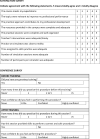Extracorporeal Membrane Oxygenation (ECMO) Training Program in A Pediatric Cardiac Intensive Care Unit: An 8-Year Single-Center Experience in Argentina
- PMID: 36346772
- PMCID: PMC9670349
- DOI: 10.21470/1678-9741-2021-0560
Extracorporeal Membrane Oxygenation (ECMO) Training Program in A Pediatric Cardiac Intensive Care Unit: An 8-Year Single-Center Experience in Argentina
Abstract
Introduction: Extracorporeal membrane oxygenation (ECMO) for temporary cardiopulmonary support is one of the most intense and technologically complex therapies offered in medicine. It is a high-risk procedure that requires specific knowledge and technical skills to perform it with good results.
Objective: The main goal of this study is to describe our extracorporeal membrane oxygenation (ECMO) training program based on the study of specialized nurses and physicians of a simulation teaching experience, conducted in a pediatric cardiac intensive care unit. The program was developed as a theoretical-practical course with final exam and annual maintenance training sessions, caring for ECMO patients, its implementation and results.
Methods: A descriptive study for registered nurses, intensivists, and cardiac surgeons. A self-administered, anonymous, and voluntary survey was conducted to assess the long-term perception about the program. Demographic data to describe the population was required, and questions about satisfaction and confidence in acquired skills and competences were asked. A descriptive statistical analysis was performed; patient survival and complications were compared before and after ECMO program using chi-square test, and P<0.05 was considered statistically significant.
Results: Twenty-four training courses were performed for 68 professionals. More than 88% of the professionals considered the course components to be adequate and complete; and 94% felt trained to manage the ECMO circuit. Most valued activities were workshops and clinical cases. Since the implementation of the training program, 88 patients were assisted, with a survival rate at discharge of 58%, higher than in the previous period (P=0.03).
Conclusion: More than 80% of the professionals considered the workshops and simulations as the most useful components. Reliance on the circuit care was higher than in training problem scenarios. Since 2013 we assisted 88 patients on ECMO, with a survival rate at discharge of 58%, within international standards results.
Keywords: Continuing Education; Demographic Data; Education; Extracorporeal Membrane Oxygenation; Intensive Care Units; Simulation; Training Courses.
Conflict of interest statement
No conflict of interest.
Figures





References
-
- Extracorporeal Life Support Organization (ELSO) ELSO Guidelines for Training and Continuing Education of ECMO Specialists [Internet] Ann Arbor (MI): ELSO; Feb. 2010. [cited 2021 Oct 28]. p. 9. version 1.5. Available from: Archive.
-
- ECMO - Extracorporeal Membrane Oxygenation . ECLS Registry Report International Summary. Ann Arbor (MI): ECMO; Apr. 2021. [cited 2022 Jul. 17]. Available from: https://www.elso.org/Registry/Statistics/InternationalSummary.aspx .
MeSH terms
LinkOut - more resources
Full Text Sources
